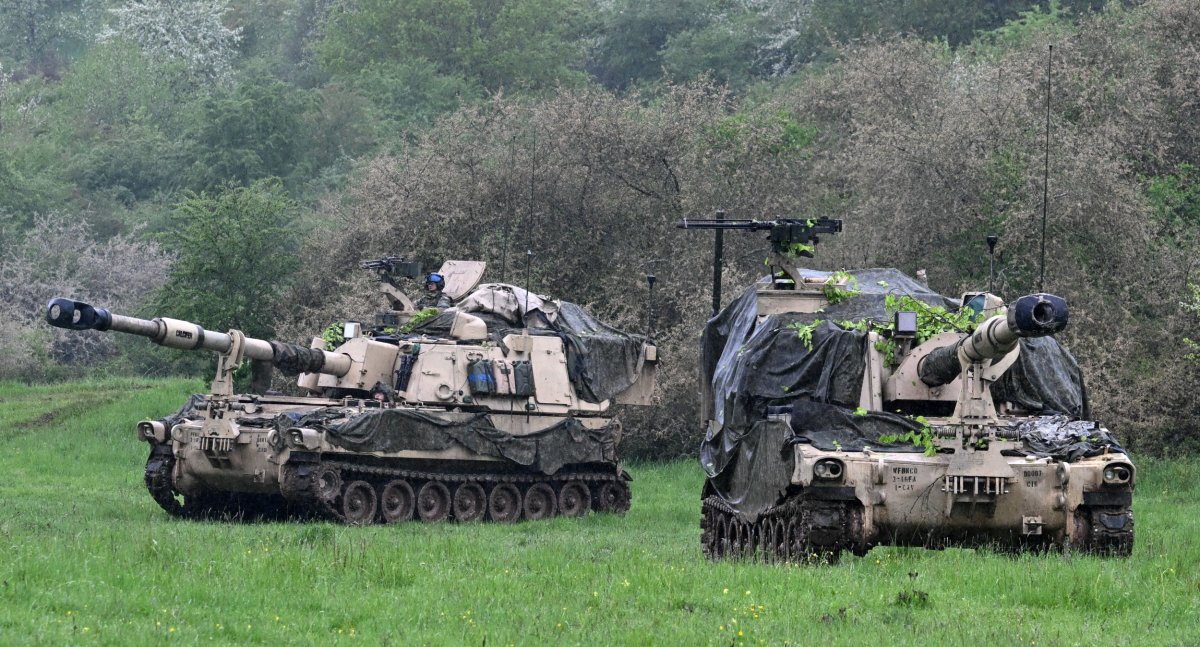The U.S. Army is canceling production of its extended range cannon artillery (ERCA) program after the equipment faced numerous engineering problems during testing.
Development of the ERCA was first announced in 2018, and the program was intended to upgrade the U.S. military's self-propelled Paladin howitzer by increasing the cannons' lethal range. According to Defense News, the ERCA system uses a 58-caliber gun tube that is mounted onto the chassis of the Paladin.
Speaking with reporters at a briefing on the Army's 2025 budget request last week, Doug Bush, the Army's assistant secretary for acquisition, said that prototyping of the ERCA concluded in the fall, and "unfortunately, [it was] not successful enough to go straight into production."

Defense News reported that the Army was working on building 20 prototypes of the ERCA. Two of the systems were intended to be used for destructive testing, while the remaining 18 were to go to a battalion.
But early testing with the prototypes showed a variety of "engineering challenges," Bush told reporters, including excessive wear on the cannon after firing off a relatively low number of rounds.
The Army did conduct a few successful tests with the ERCA, including hitting a target 43 miles away at a training ground in Arizona in December 2020. At the time, Brigadier General John Rafferty, who was leading development efforts on the ERCA, told reporters that he didn't "think our adversaries have the ability to hit a target on the nose at 43 miles."
The ERCA was a part of the military's efforts to extend its artillery range capabilities on the battlefield. Bush told reporters last week that the Army is now making a "shift from developing something new to working with what is available both domestically and internationally to get the range," reported Defense News.
The Army also announced last week that it is requesting a $185.9 billion budget in fiscal year 2025, a roughly $429 million—or 0.2 percent—increase from its 2024 fiscal year request. The budget plan includes $55 million intended for finding extended-range cannon capability.
The Pentagon's total budget request in 2025 totals $849.8 billion, and includes a 4.5 percent pay raise for service members, according to Deputy Defense Secretary Kathleen Hicks, who told reporters at a briefing on Monday that the budget request "upholds our commitment to our people, the service members, military families and civilians who work tirelessly to defend this nation day in and day out."
As fighting continues in Congress over federal spending, the Pentagon's activities are being supported by a continuing resolution. The Defense Department said in a release on Monday that while its fiscal 2024 budget request should have gone into effect on October 1, 2023, the DOD is operating under a 2023 funding level.
"As we all know, delayed funding means delayed contracting, means delays in training and means delays in delivery of new capabilities," Michael McCord, senior Pentagon official, said during a conference in Washington, D.C., last week.
"National security is serious business, life-or-death business, and we need to act as if the collective 'we' in this town treat that with the seriousness it deserves," McCord added. "To me, tolerating four months, five months, six months of [continuing resolutions] year after year after year doesn't meet that standard of seriousness."
Uncommon Knowledge
Newsweek is committed to challenging conventional wisdom and finding connections in the search for common ground.
Newsweek is committed to challenging conventional wisdom and finding connections in the search for common ground.
About the writer
Kaitlin Lewis is a Newsweek reporter on the Night Team based in Boston, Massachusetts. Her focus is reporting on national ... Read more
To read how Newsweek uses AI as a newsroom tool, Click here.








